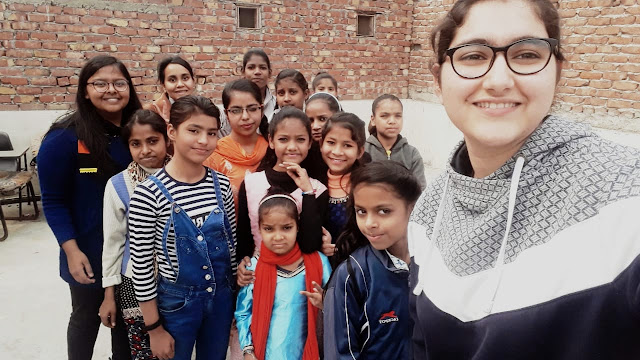PERIOD: Let's Begin The Sentence.
Menstruation, the flow
which ensures the flow of life, is one the topic that most are hesitant to talk
about. The taboo has existed since forever and has continued to exist in most
parts of the society even now. The creation of a menstrual taboo took
place independently and repeatedly across different societies and geographies. Analogies are
used to serve the purpose by giving us words to talk about things that are
considered culturally wrong, which happens in this case as well. This narrative
crafted has had severe impacts on the mindset of men and overall
well-being of women. The impact of typical menstrual taboos is clear: they can
lead to significant challenges in menstrual management, adverse reproductive
health outcomes, social ostracism, diseases, and even death.
This creates the dire
need to bring a change in the thought process.
So, on behalf of
CRY-Child Rights and You, campus volunteers from Miranda House College went to
one of our projects in Jahangirpuri on 17th February, to spread awareness
about menstrual hygiene to the teenage girls there. One of the primary
objective was to marginally normalize the 'much-shushed period talk' that has
been inherently crafted by our society since generations. Volunteers went
there, prepared to address the supposedly shying away girls. But to their
surprise, they were welcomed by more than 25 girls, aged between 10 and 19.
Still, to tackle the reluctance in the eyes of some, they started with a round
of introduction and then session started, which covered explanation regarding
meaning & importance of menstruation, need of maintaining proper hygiene
and importance of healthy diet. Many of them were aware of the do's and don't's
which are to be taken into consideration during the period days. They were
asked about their reaction when they started having periods for the first time.
And smashing the preconceived idea of them being shy, they shared their
experiences & the complications they face while menstruating, how they're
not permitted to talk it out loud inside their homes and the restrictions
imposed during those 5 days.
Volunteers gave them
information and they shared some experiences in return, and that's how it
became more of a discussion than a lecture. After the verbal description, the
session was made more interactive and interesting by showing them videos about
menstruation and asking them questions.
"I have been
working with these children for months and I was surprised to see the interest
girls showed for the session. Some of them knew about it, while others were
curious to know about the topic", said a volunteer.
The girls who,
initially, were hesitant, began to join in the conversation freely and that
serves the purpose.
It’s clear that the
way people talk about menstruation is slow to change because of how deeply
menstrual taboos are ingrained in our cultures, beliefs, and histories. The
civilisations which give us our understanding of our bodies were formed around
these taboos. Removing such taboos requires the systems to change, and sessions
like this are the changing steps; and the response shown by those girls was
nothing, but the brightest ray of hope. The increasing efforts worldwide, to
empower, educate, and engage country leaders, communities, families, and
adolescent girls and boys about menstruation, and to highlight the right of
women and girls to hygienically manage their periods, are fresh breath of
air.
We may never know how,
exactly, menstrual taboos were established, but what we do know is how to
eradicate them. And together, slowly and steadily, we would attain our
objectives.
- Kritika Yadav
CRY Volunteer






Comments
Post a Comment